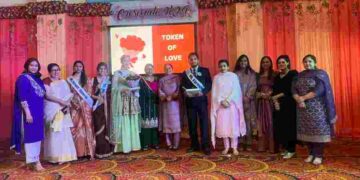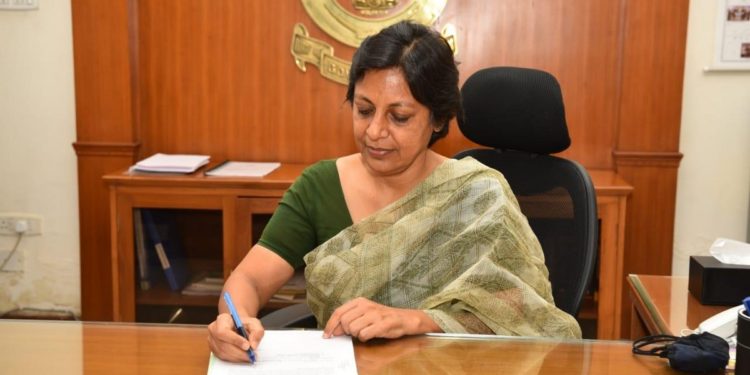· Punjab Chief Secretary participates in virtual Eye Donation Fortnight event at PGIMER
· Also felicitates Corneal Surgeons and hails them “Cornea Heroes”
Chandigarh, September 10:
Corneal Blindness Backlog Free (CBBF) Punjab initiative will be reinvigorated, said Punjab Chief Secretary Mrs. Vini Mahajan, while addressing a virtual Eye Donation Fortnight (EDF) 2020 event held at PGIMER, Chandigarh.
During her address as a chief guest, Mrs. Vini Mahajan said, as there has been an 80% decrease in Eye Donations and 78% decrease in the number of Keratoplasty surgeries in the months of March to June 2020 all over India. Thus, it is need of the hour to boost the CBBF Punjab, which was initiated in 2015. She said that a number of people have contributed to achieve this coveted tag of Corneal Blindness Free State. With the achievement, the state of Punjab has not only set an example for all the other states across the country to follow but also proved that it has the potential to come up as a leader.
Hailing the Corneal Surgeons as “Cornea Heroes”, the Chief Secretary said that the success of Corneal Blindness Backlog Free Punjab (CBBF) initiative could not have been possible without the coordination of all the stakeholders i.e. eye donors, eye surgeons, NGOs etc. She also appreciated the services rendered by Prof. Dr. Radhika Tandon from RP Centre AIIMS N-Delhi, as a technical expert.
During this Eye Donation Fortnight (EDF) 2020, which was organized by Community Medicine and School of Public Health Department of PGIMER, Chandigarh, National Programme for Control of Blindness and Visual Impairment, Punjab & UT Chandigarh, Rotary Eye Bank & Corneal Transplant Centre, Hoshiarpur and Strategic Institute for Public Health Education and Research (SIPHER), Corneal Surgeons were felicitated, who did an exemplary work for promoting eye donations and surgeries, and also declared them as “Cornea Heroes”.
The Chief Secretary Vini Mahajan and Director PGI Prof. Dr. Jagat Ram felicitated Dr. Amit Gupta (PGI Chandigarh), Prof. Dr. Shakeen Singh (SGRD Medical College, Amritsar), Prof. Dr. Karamjit Singh (GMC, Amritsar), Dr. Ramesh Kumar (Punarjot Eye Bank, Ludhiana), Dr. Ashok Sharma (Cornea Center Chandigarh) and Dr. Rohit Gupta (Tricity Eye Hospital, Kharar).
There were some state-specific rules changed to facilitate eye donations and charges for registration were reduced from 1.5 lakh to 10,000 to boost the movement, said Principal Secretary Health Department, Punjab Mr. Hussan Lal, adding that the Punjab Government will coordinate with all stakeholders including civil society organizations and Academic Institutions to give momentum to the initiative.
Strategic Institute for Public Health Education and Research President Dr. Rakesh Gupta, who has been associated with CBBF Punjab initiative since its inception, said that 5 years ago in September 2015, the CBBF initiative was conceptualized by Mrs. Vini Mahajan and she ensured that all the stakeholders including Government/Private Corneal Surgeons, NGOs, Para Medical Staff and even Police Department were on board. The major gains were qualitative improvement in eye donations and Keratoplasty Surgeries as there was regular monitoring.
Prof. Sonu Goel, PGI Chandigarh said that this campaign aims at creating mass public awareness about the importance of eye donation and to motivate people to pledge their eyes for donation after death so that many blind people can get a gift of sight. During her Keynote address, Prof. Dr. Radhika Tandon said there are around 1.2 Million corneal blind persons in the country and about 20,000 to 30,000 cases get added every year. In addition, we have 5-6 million unilateral corneal blind people in India. India has made great strides in addressing blindness overall but lags in treating corneal blindness due primarily to a lack of transplantable corneal tissue. Awareness campaigns and eye bank development efforts in the past 7 years have shown modest success, with increased transplant surgeries 2011 onwards. However, this growth rate is far below the Vision 2020 goal of 1 lakh transplants per year by 2020.








